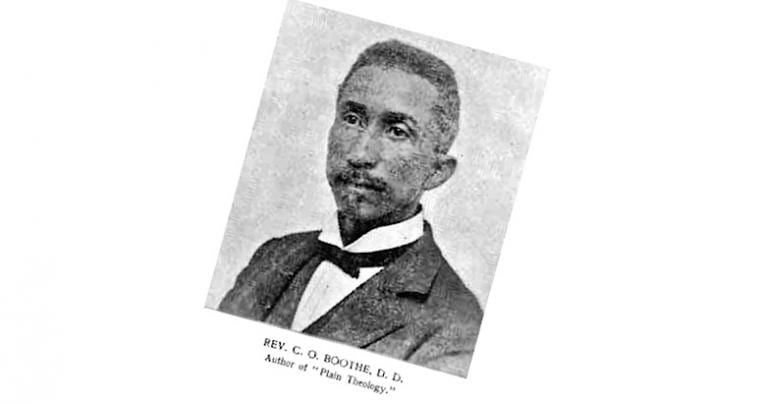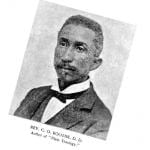 What is a human being?
What is a human being?
Our answers will do much to shame society, though our practice will tell us more about what we actually believe. A minority of American Christians persuaded themselves that they could hold to a Christian anthropology and enslave people based on race. In fact, one Baptist, Thomas Dixon, convinced himself that separation of the races and white supremacy were the two most important issues of the era.
Against this was the majority of global Christianity, but a most powerful exposition of that majority view, the equal humanity of all persons, came from the liberated. Dr C.O. Boothe had been born into a slave system and was part of African-Americans liberating themselves from that system. When he wrote about the doctrine of man, he was writing about ideas that had power to set people free if all those in America who professed to believe them acted according to their beliefs.
He also wanted the plain people (his language) to be introduced to a systematic theology. A person with a Bible has great resources, yet the collection does not present ideas in a systematic manner. There are many genre (poetry, Wisdom literature, ancient forms of history, epistles, apocalypse) and this is a strength. The messages of God to humankind come in stories, proverbs, poems, and letters. The people of God, over time and with great intellectual effort, also found the common themes and great truths of Scripture. What might be unclear in one book (for example, the common humanity of all people) is very plain in another. Boothe gives us an outline with illustrations that help organize the great truths of Christianity that span multiple books.
Left to myself, I can find favorite themes and get stuck on those while ignoring other important ideas. One reason I read other voices or books outside my normal teaching load is that this helps me avoid such narrowing down. A sweeping overview of theology such as this one helps me see the whole picture. Boothe’s insistence on a minimum of theological vocabulary and rejection of any jargon is refreshing.
Boothe is writing at the start of what can properly be called Evangelicalism and since I write (as an Orthodox person) as a guest in the Patheos section of that great tradition, since so many of my students and colleagues are Evangelical, a reminder of the roots and perspectives of the best of the movement is most helpful! As media and news reporters struggle to define “Evangelical” in America, Rev. Dr. Charles Octavius Boothe should be required reading. For Evangelicals, and those of us who are allies, we must assert the fact that people like Boothe were there from the start and must be heard as they were heard by many tens of thousands of Evangelicals in America.
Boothe discusses the race question in this section, by which he means the human race. The brilliance of using the term “race,” the undermining of the Dixon line, in his discussion of being human and the common nature of each individual man is delightful and demolishes racialism without mentioning the cancer. Browne asserts Christian doctrine, ideas that many Protestant seminaries at the time affirmed, about man, yet these very ideas were denied in practice by some of those seminaries.
“There is no respect of persons with God. As many as have sinned without law shall perish without law; and as many as have sinned in the law shall be judged by the law” (Romans 2:11, 12; Ephesians 2:1–3).
This is an exposition of the Christian view of man, fully in the Evangelical mainstream. Dr. Browne sketches out what Christians should know advancing his ministry on his terms. Interestingly, Browne agrees with many Eastern Fathers in seeing man created as an “infant” with the potential for moral greatness. Adam fell not from the dizzying heights of a perfected man, but stumbled from the road that would have brought him there.
God wanted Adam to become a free moral agent:
I know that no sane man will contend that God should not have put man under command. Some one may ask why God left Adam. To this I reply that the only act that has any personal virtue in it is the act that is born of the intelligent, deliberate, obedient choice of the actor; and the act that is performed only because of the presence of another has in it no virtuous character at all.
Men must consent and choose for themselves or they are being deprived of the ability to grow into the fullness of manhood.
Boothe structures the text apologetically. He states a truth, briefly explains, then answers common objections. “Here it may be asked. . . ” followed by “Replying to this, I would say . . .” Boothe demonstrates the doctrine of man with his approach to teaching the doctrine of man. He respects his audience, gives them the truth, and then parries objections looking for mature consent.
When it comes to man, to us, Boothe sees us choosing badly: corporately and individually. We are broken, but Boothe sees hope in Christ.
———————————————————–
Boothe, Charles Octavius. Plain Theology for Plain People (Lexham Classics) . Lexham Press. Kindle Edition.











